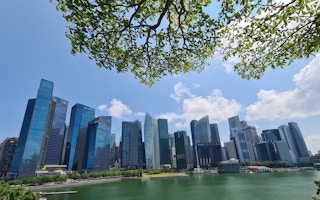Should Singapore aim to hit net-zero carbon emissions by 2050? For sure.
To continue reading, subscribe to Eco‑Business.
There's something for everyone. We offer a range of subscription plans.
- Access our stories and receive our Insights Weekly newsletter with the free EB Member plan.
- Unlock unlimited access to our content and archive with EB Circle.
- Publish your content with EB Premium.
Which is why the latest public consultation launched to garner feedback on this commitment is rather confusing.
One of the key questions the government is asking its citizens is whether it should update its previous pledge of trying to hit net-zero emissions “by or around” 2050.
So “by or around” has been simplified to “by”. Which implies a firmer commitment for reaching net-zero by mid-century.
The move lacks the pace Singapore has finally started to show in its recent climate action, which environmental groups have said has already come too late.
Singapore’s first climate target set in 2015, to reduce emissions intensity, was sorely lacking. In 2019, the Prime Minister declared climate change to be an existential threat, and a year later Singapore pledged to reach net-zero in the second half of this century “as soon as is viable”.
Earlier this year, the target was tweaked to “by or around” mid-century.
Since 2019, the country also implemented a carbon tax, and scaled it from S$5 (US$3.60) a tonne of emissions to up to S$80 (US$57) by 2030. It set in motion a plan to get almost a third of its electricity from clean sources overseas by 2035, to make up for its limited renewables potential domestically. It gave out S$55 million (US$39 million) for research into hydrogen fuel and carbon capture. A 2040 phase-out of gas cars was pledged.
Against this backdrop, I cannot help but feel like Singapore has stalled a little, if a public consultation is needed to narrow the net-zero target down to 2050.
Granted, it becomes increasingly difficult to realistically ratchet up climate ambition, especially when it comes to net-zero emissions. The current geopolitical situation, dominated by conflict and the long tail of Covid-19, doesn’t help.
Is the Singapore government worried that the public may think it is out of touch with reality, if it continues to trumpet climate in a period of hardship and uncertainty? I sure hope the government is not having second thoughts about its own climate ambitions.
Show leadership
There are certain issues in which governments follow public sentiment, and others where governments lead to create change. Climate, and reaching net-zero by 2050 as called for by scientists worldwide, is something the Singapore government should take the lead on. Singapore has the responsibility to, given its status as a rich and advanced country, and its evaluation of global warming as an existential issue domestically.
I’ll be frank. I was okay with having our climate target left as “by or around” 2050 for now. It is not Paris Agreement-aligned language, and it gives Singapore wiggle room. But I felt it does reflect a degree of honesty in the challenges Singapore faces with decarbonisation – petrochemicals still make up a fifth of industrial output, and the sector still employs 27,000 people. I also thought it was the lesser of two evils to leave it and get down to action quickly, rather than take more time to quibble over precise targets now.
Asking the public if it is ok to move from “by or around” to “by” is the kind of quibbling we could do without.
Need data for feedback
Getting the public involved in decision-making is good governance, and public consultations remain very relevant in addressing climate change. But I think the latest climate survey can be improved if the government provides more data before it asks for feedback.
Since the question on whether we should move from “by or around” 2050 to “by” 2050 is already asked, can we get more information to help us understand the difference between the two targets?
What is materially different, in terms of the actions that need to be taken? How far will the current measures Singapore has already announced bring us towards the targets?
How can I contribute?
The public consultation can be accessed here, and will be open till 26 September 2022.
The blurb of the climate survey mentioned trade-offs. Are we able to have an estimate of how much, in dollar terms – just like how we were told to expect electricity bills to increase 4.5 per cent when the S$80 carbon tax kicks in in eight years? A pinpoint figure is probably not possible, but a range would help.
Getting the public to comment on such information will provide the government with a clearer picture of what the public wants, the level of sacrifice it is able to stomach, and whether people think the administration is using the right strategies.
As it stands, I find it hard to give an informed reply as to whether Singapore should aim for net-zero emissions by 2050, even though it remains something I personally support.
2030
The latest public consultation also contains a question on Singapore’s 2030 interim climate targets. I feel this is the most important question in the survey – given how important setting short-term targets is, and how outdated Singapore’s current pledge looks.
The country is currently aiming to halt the growth of emissions by around 2030, and then start cutting it thereafter. This is incompatible with the assessment by the Intergovernmental Panel on Climate Change (IPCC) that emissions have to peak by 2025 and drop by over 40 per cent by 2030. Even if the world achieves this, temperatures will still overshoot the 1.5°C mark slightly, and drop below this safety threshold for climate risks again by 2100.
So yes, an update is needed. But again, I’d prefer to give this feedback not based on principles, but a better understanding of where Singapore is now, where our existing measures would take us by then, how much more do we have to do, how much my cost of living will rise by, and whether I will have to wait longer for a public housing apartment – our buildings store huge amounts of embodied carbon.
But notwithstanding, we have a climate survey, and I appreciate the open-ended questions in it. Here are my placeholder answers, pending any further information the government is willing to share:
- Thoughts on Singapore thinking of hitting net-zero emissions by 2050? It is just right, and it is aligned with the Paris climate accord.
- Thoughts on our 2030 targets? They do not go far enough. We should aim to cut emissions by at least 40 per cent based on IPCC’s modelling. This will probably be challenging, and I welcome debate on how it can be done.
- What can the government do to support Singapore’s low carbon future? Take the lead, but be open with the public about projections and challenges. And protect those most affected by the energy transition
- What about businesses? Don’t lobby hard against the government’s climate rules. There are “allowances” promised in Singapore’s carbon tax, and details are still being worked on. I hope the eventual allowances will not water down the tax.
- What about individuals? Call for greater climate ambition, but also understand what the transition means on a personal level. Ask questions if you’re unclear.
- I am willing to help Singapore realise its net-zero ambitions even though there are trade-offs: agree.
- Do you have other thoughts? The region is looking to Singapore to show real leadership on climate action. So lead.











